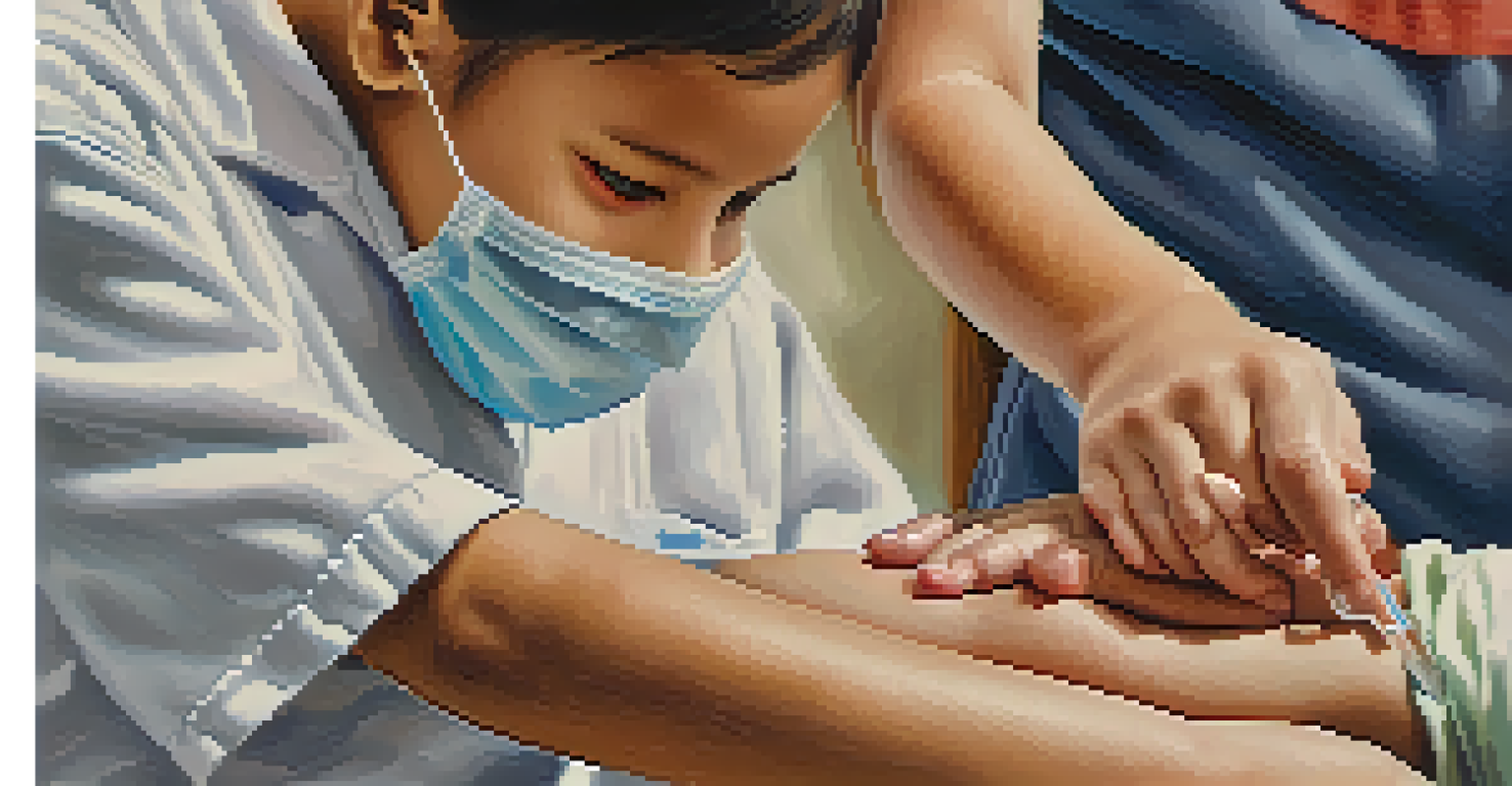The Importance of Regular Check-Ups for Kids' Health

Understanding the Role of Regular Check-Ups
Regular check-ups are essential for monitoring children's health as they grow. These visits allow healthcare providers to assess development, address concerns, and provide preventive care. Think of regular check-ups as routine maintenance for a car; just as you wouldn’t ignore a check-up for your vehicle, you shouldn’t overlook your child’s health needs.
An ounce of prevention is worth a pound of cure.
During these appointments, doctors can track milestones and ensure that your child is meeting their growth targets. They also help to establish a trusting relationship between your child and their healthcare provider, making future visits less daunting. Just like how consistent practice can make a musician more comfortable on stage, kids benefit from regular doctor visits in building familiarity.
Moreover, regular check-ups enable early detection of potential health issues. Catching problems early can lead to more effective treatment and better outcomes. This proactive approach is similar to spotting a leak in your roof before it causes extensive damage; addressing health concerns early on can save time, money, and stress down the line.
Vaccinations: A Key Part of Pediatric Check-Ups
Vaccinations are a crucial aspect of children's healthcare, protecting them from various diseases. During routine check-ups, healthcare providers ensure that kids receive their vaccinations on schedule. This is like following a timeline in a recipe; each step is important for the final dish to turn out perfectly.

Staying up to date with vaccinations not only protects your child but also helps protect the community by preventing the spread of contagious illnesses. This concept is similar to herd immunity; the more people who are vaccinated, the safer everyone is. Regular check-ups serve as reminders to keep these important health measures on track.
Importance of Regular Check-Ups
Regular check-ups are vital for monitoring children's health, detecting issues early, and establishing a trusting relationship with healthcare providers.
Additionally, doctors can discuss any concerns parents may have about vaccinations during these visits. Open communication helps alleviate fears and misconceptions, ensuring that everyone is on the same page. Just as a gardener nurtures plants by providing the right conditions, healthcare providers nurture children's health through education and support.
Monitoring Growth and Development Over Time
One of the primary purposes of regular check-ups is to monitor growth and development. Healthcare providers use growth charts to track a child’s height, weight, and head circumference over time. This continuous assessment is akin to measuring the progress of a project; it helps to see if everything is on track.
The greatest wealth is health.
Parents can gain valuable insights into their child’s health by understanding these growth patterns. If a child is falling behind or showing unusual growth spurts, it may indicate underlying health concerns that need to be addressed. Just as you would adjust your strategy in a game based on the score, monitoring growth allows for timely interventions.
Moreover, these appointments provide an opportunity to discuss developmental milestones, such as speech, motor skills, and social interactions. Engaging in conversations about these aspects fosters a comprehensive view of a child’s well-being. Just like a coach reviews a player’s performance, parents can work with healthcare providers to ensure their child is thriving.
Addressing Behavioral and Emotional Health
Regular check-ups also offer a chance to address behavioral and emotional health concerns. Mental well-being is just as important as physical health, and routine visits allow for discussions about any issues affecting a child's mood or behavior. It’s similar to checking in with a friend; sometimes, a simple conversation can reveal deeper feelings that need attention.
Healthcare providers can offer guidance on common childhood challenges, such as anxiety, bullying, or social skills development. By addressing these issues early, parents can equip their children with the tools they need to cope effectively. This proactive approach can help prevent more serious problems from developing later on.
Vaccinations Protect Children
Staying up to date with vaccinations during check-ups not only safeguards individual health but also contributes to community immunity.
Additionally, regular check-ups provide a safe space for children to express themselves. When kids feel comfortable talking to their doctor, they are more likely to share their feelings and experiences. Just like a trusted mentor in sports, a healthcare provider can guide children through tough times.
Promoting Healthy Habits Through Education
Check-ups are an excellent opportunity for healthcare providers to educate both children and parents about healthy habits. Discussions may include nutrition, physical activity, and sleep hygiene, all of which play a vital role in overall health. Think of these conversations as planting seeds; the more knowledge is shared, the more likely healthy habits will grow.
By instilling healthy habits early on, parents can help set their children up for a lifetime of good health. Just like a tree needs proper care to flourish, children benefit from guidance on making healthy choices. Regular check-ups reinforce the importance of these habits and provide practical tips for families.
Moreover, healthcare providers can tailor advice based on individual needs and lifestyle. This personalized approach ensures that recommendations are relevant and achievable. Just as a tailor customizes a suit, personalized healthcare advice fits better into a child’s life.
Building a Strong Parent-Doctor Relationship
Regular check-ups foster a strong relationship between parents and healthcare providers. This partnership is crucial for effective communication and collaboration in managing a child's health. Just as a coach and athlete work together toward a common goal, parents and doctors must share insights and concerns.
Establishing trust with the healthcare provider can make it easier for parents to discuss any issues or questions. When parents feel comfortable, they are more likely to seek help when needed, ensuring that their child receives comprehensive care. Like a solid foundation in a house, a strong parent-doctor relationship supports the entire structure of a child's health.
Building Healthy Habits Early
Routine check-ups provide opportunities for education on healthy habits, setting the foundation for lifelong well-being.
Furthermore, continuity in care allows healthcare providers to gain a deeper understanding of a child's medical history and family dynamics. This knowledge can lead to more informed decisions and recommendations. Just as a long-time friend knows your story, a familiar doctor can provide tailored care based on familiarity.
The Long-Term Benefits of Consistent Check-Ups
Investing time in regular check-ups can lead to long-term health benefits for children. Consistent monitoring helps to identify trends and potential issues that may arise over the years. It’s like a financial investment; the earlier you start, the more significant the returns can be.
Children who receive regular check-ups are more likely to develop a positive attitude toward healthcare. They learn the importance of routine visits and are less likely to resist going to the doctor as they grow. Similar to cultivating a love for reading, instilling a positive view of healthcare can benefit children throughout their lives.

In the long run, these check-ups can contribute to healthier adults. By prioritizing health from a young age, children are more likely to carry healthy habits into adulthood. Just like nurturing a garden, the care you provide during those early years can lead to a flourishing future.